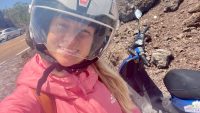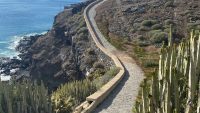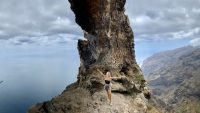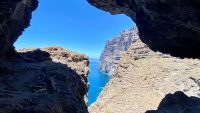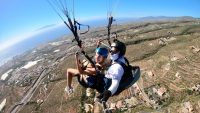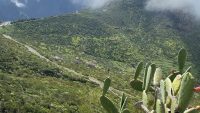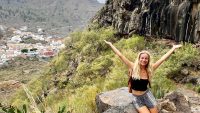Internship in Tenerife – A Lifetime Journey and Enriching Experience
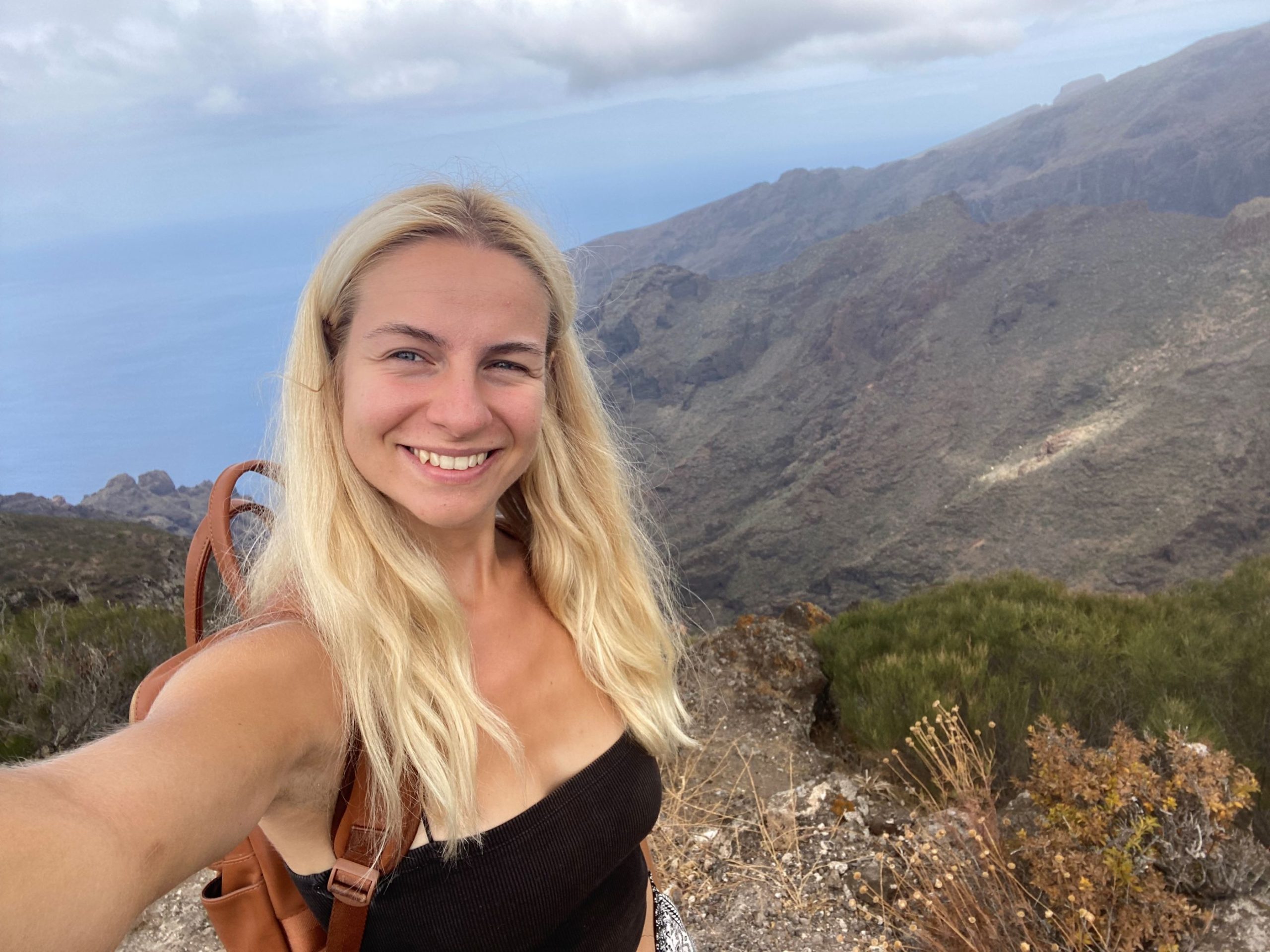
“If you haven’t gone abroad during your studies, it’s your biggest mistake. An internship abroad can become the journey of a lifetime. It’s absolutely essential,” says Agnė Staupelytė, who studied in Finland under the Erasmus+ programme and also undertook internships in Vilnius and Tenerife. Next year, the third-year student of Pedagogy of Primary Education and Early Foreign Language Teaching at Vytautas Magnus University (VMU) Education Academy is set to undertake an internship in Tokyo, Japan.
This year, while studying in her third year at VMU, Agnė completed her pedagogical practice at the Baltic International School in Tenerife. At this international Lithuanian school for preschoolers and primary school children, she taught English and art.
Grew as a person
The most valuable experience for the student was not only the three months she spent working with the children at the school but also the weekends she spent exploring Tenerife: Agnė travelled around the country by car, relaxed on the beaches, went to the mountains on a motorcycle, and even embarked on challenging solo pilgrimages.
“During the hikes in the mountains, I would walk 15-20 kilometres and climb uphill 2-3 kilometres. I had to overcome sand, rocks, and gorges, and endure brutal heat. But the feeling of returning exhausted and overheated, yet having accomplished what I set out to do, helped me grow as a person. After conquering one tough hike, I would take on an even more challenging one the following weekend. Having packed sandwiches and a few bottles of water in my backpack, I completed 5 solo hikes.
Those three months were incredible – I felt like I was in a movie. When you’re climbing a mountain, scrambling through gorges, pushing through cacti and vines, and at the top of the mountain, with eagles soaring below your feet, enjoying a sandwich… This experience has helped me to get to know myself better and to understand what is truly important to me in life. I can confidently call it the journey of a lifetime,” Agnė shares about her three months spent on the largest of the seven Canary Islands in the Atlantic Ocean.
Teaching without smart technology
During her first and second years of studies, Agnė undertook her pedagogical practice in schools in Vilnius. In her third year, she sought a school away from Lithuania, which seemed like a great opportunity to explore the culture of another country. She was delighted to discover a Lithuanian heritage school in Tenerife – it was intriguing to visit a volcanic island in Spain, and she was captivated by the school’s Lithuanian spirit, which is very important to her.
Upon arriving at the Baltic International School, the first things that struck her were the warm sunny weather and the location – the school is situated right on the shore of the Atlantic Ocean.
“As soon as I arrived, I began teaching Lithuanian language and art to kindergarteners and primary pupils. Having worked with five-year-olds and ten-year-olds, I felt as though I had graduated from a school of life on how to communicate and get along with children of such different ages. How did it go? I think it went very well. This is evident from the fact that the children would start cheering, ‘hooray, it’s Agnė’s class again,’ when I entered the room,” she laughs.
Agnė was surprised that the school had only one projector and a couple of laptops. There was no other smart technology used during lessons: “Today, when education experts constantly emphasise the digitalisation of schools as a priority, it was surprising that this school was taking a different path. And the most amazing part is that even without these devices, teachers and children are incredibly motivated. We would come up with the most interesting activities that didn’t require any technology. This shows that it’s not the equipment that’s most important, but the people and their willingness to make learning an engaging and interesting process.”
Strictly removed a particular phrase from her vocabulary
When asked about the interesting activities she organised for both kindergarteners and primary school pupils, Agnė Staupelytė admits that during her practice, she even tried out activities that she had only heard about from teachers and during discussions while studying at VMU.
The children particularly enjoyed playing the game “Alias” during English lessons, creating scenarios using choices A or B in the stories, which determined the courses of the narratives, and conducting various experiments with glue, lens solutions, soda, salt, and paints for making slime, candy houses, and 3D model aquariums, moulding souvenirs from salt dough, making etchings from egg yolks, assembling Japanese hieroglyphs, and more.
According to Agnė, the children were most captivated by games that required no technology but needed intrigue, excitement, unpredictability, and experimentation. They wanted to try and create things they had not seen, heard, or touched before.
“Until then, I hadn’t realised that when communicating with young children, it’s a mistake to start a conversation with a request like ‘could you do this or that?’ Such questions give children the opportunity to say ‘no’, oppose, and get involved in unnecessary arguments and discussions. I strictly removed this phrase from my vocabulary. It was this school that taught me to tell the children, ‘please do this and that.’ Speaking in this way allowed miracles to happen. It seemed that the children no longer had the space to argue and they did what was necessary. For me, this was a great revelation: communicating with children requires short, clear sentences and a gently authoritative tone, rather than rhetorical questions,” Agnė shares about her experience.
Concerns about pupil reception and acceptance
Agnė does not hide the fact that on her way to Tenerife, she felt fear and anxiety about how the children would receive her. She says that leaving for a foreign country, communicating with children for three months, and seeing that they did not accept, like, or want to learn with her seemed like the worst nightmare. So at that time, she thought that her most important goal was to earn the children’s affection and trust.
“I thought I had to do everything I could to foster that love. When I arrived and started interacting with the children, it was clear that I had managed to establish that relationship. In lessons, my focus was not on the curriculum or methodology, but on sensing what was interesting to the children and engaging them in the learning process. One class was most interested in construction, while another was captivated by geography and travel, so we learned English through travel stories and maps. Everything I gave the children was well worth it – they really enjoyed my lessons,” Agnė rejoiced.
Having felt that she got to know Tenerife very well in three months, Agnė hopes to undertake an internship in Tokyo, Japan, next academic year.
According to her, the opportunity provided by the university to undertake an internship is an invaluable gift for a student – it is a great way to experience the culture of another country, to travel, and to gain professional experience: “While studying in Finland, I attended courses, wrote papers, and deepened my theoretical knowledge, but undertaking an internship in Tenerife taught me much more, as I learned not by attending university lectures but by doing and gaining real experience. Teaching children and seeing their gratitude, joy, interest, inquisitive and happy eyes enriched my experience – something I will never forget for the rest of my life.”

Co-Funded by the European Union. Views and opinions expressed are however those of the author(s) only and do not necessarily reflect those of the European Union or the European Education and Culture Executive Agency (EACEA). Neither the European Union nor EACEA can be held responsible for them.

